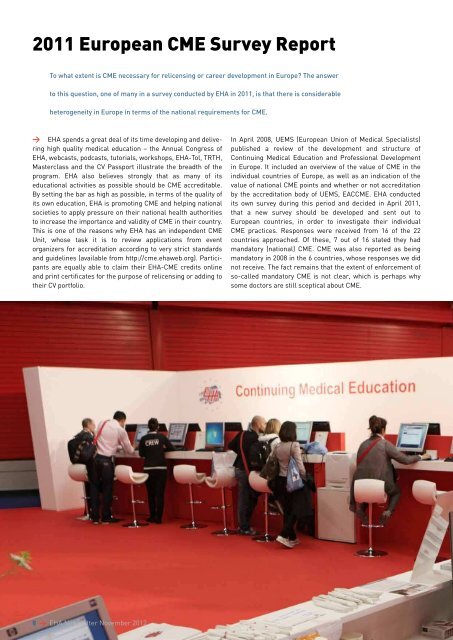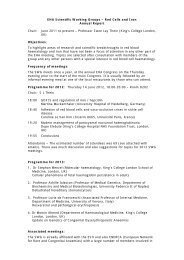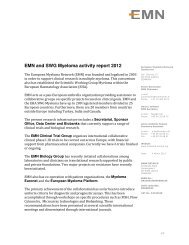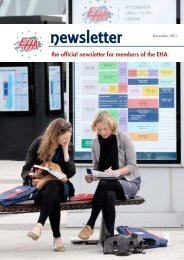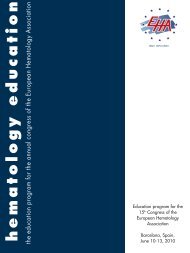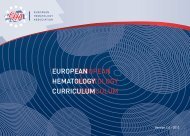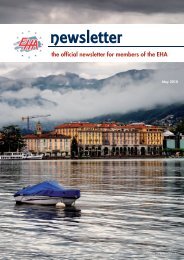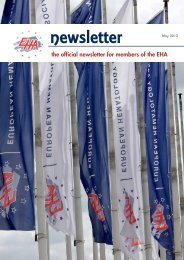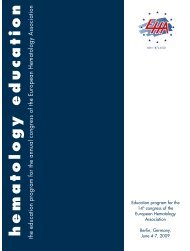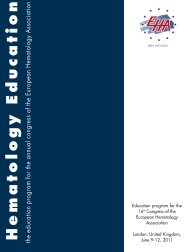Newsletter May 2012 - European Hematology Association
Newsletter May 2012 - European Hematology Association
Newsletter May 2012 - European Hematology Association
Create successful ePaper yourself
Turn your PDF publications into a flip-book with our unique Google optimized e-Paper software.
2011 <strong>European</strong> CME Survey Report<br />
To what extent is CME necessary for relicensing or career development in Europe? The answer<br />
to this question, one of many in a survey conducted by EHA in 2011, is that there is considerable<br />
heterogeneity in Europe in terms of the national requirements for CME.<br />
> EHA spends a great deal of its time developing and delivering<br />
high quality medical education – the Annual Congress of<br />
EHA, webcasts, podcasts, tutorials, workshops, EHA-Tol, TRTH,<br />
Masterclass and the CV Passport illustrate the breadth of the<br />
program. EHA also believes strongly that as many of its<br />
educational activities as possible should be CME accreditable.<br />
By setting the bar as high as possible, in terms of the quality of<br />
its own education, EHA is promoting CME and helping national<br />
societies to apply pressure on their national health authorities<br />
to increase the importance and validity of CME in their country.<br />
This is one of the reasons why EHA has an independent CME<br />
Unit, whose task it is to review appli ca tions from event<br />
organizers for accreditation according to very strict standards<br />
and guidelines (available from http://cme.ehaweb.org). Participants<br />
are equally able to claim their EHA-CME credits online<br />
and print certificates for the purpose of relicensing or adding to<br />
their CV portfolio.<br />
8 > EHA <strong>Newsletter</strong> November <strong>2012</strong><br />
In April 2008, UEMS (<strong>European</strong> Union of Medical Specialists)<br />
published a review of the development and structure of<br />
Continuing Medical Education and Professional Development<br />
in Europe. It included an overview of the value of CME in the<br />
individual countries of Europe, as well as an indication of the<br />
value of national CME points and whether or not accreditation<br />
by the accreditation body of UEMS, EACCME. EHA conducted<br />
its own survey during this period and decided in April 2011,<br />
that a new survey should be developed and sent out to<br />
<strong>European</strong> countries, in order to investigate their individual<br />
CME practices. Responses were received from 16 of the 22<br />
countries approached. Of these, 7 out of 16 stated they had<br />
mandatory (national) CME. CME was also reported as being<br />
mandatory in 2008 in the 6 countries, whose responses we did<br />
not receive. The fact remains that the extent of enforcement of<br />
so-called mandatory CME is not clear, which is perhaps why<br />
some doctors are still sceptical about CME.<br />
One reason may be that, according to our<br />
survey, there is a lack of monitoring and<br />
evaluation of CME credits in some countries,<br />
which may discourage some hematologists from<br />
claiming. For instance, one of the countries that<br />
responded said that, although CME is<br />
mandatory, the processes of verification and<br />
monitoring have not been clearly defined. Also,<br />
in the majority of respondent countries, the<br />
responsibility for classifying an activity as<br />
educational lies with the national authorities,<br />
although the type of authority varies greatly.<br />
Nevertheless, the overriding message in<br />
<strong>European</strong> hematology is that CME is becoming<br />
increasingly important and better organized. So,<br />
how can this trend be continued?<br />
For several countries it would be helpful to have<br />
a clearly defined role for credits in the process of CME, which<br />
are respected by all EU countries. Therefore, improving the<br />
quality of EHA-CME accreditation and promoting the value of<br />
EHA-CME credits across Europe, so that more countries take<br />
them into account towards relicensing, would be a step in the<br />
right direction. Equally, since half the survey respondents said<br />
there is no CME monitoring system in their country, it seems<br />
appropriate for the EHA-CME Unit to become more active in<br />
this area. By supporting event organizers in their activities, as<br />
well as in the enforcement of our Standards and Guidelines<br />
and offering provider status when they are successful, EHA and<br />
EHA-CME are sending a signal to national and <strong>European</strong><br />
authorities that we take the business of CME very seriously. In<br />
order to help achieve this goal, EHA-CME is making<br />
improvements to its system (more user-friendly and<br />
increasingly automized), clarifying its Standards and Guidelines<br />
for event organizers, simplifying and adding value to its online<br />
claiming questionnaire and introducing an audit form for event<br />
inspection. We hope that, by doing so, more hematologists will<br />
Come, Meet and Engage!<br />
EHA <strong>Newsletter</strong> November <strong>2012</strong> > 9


